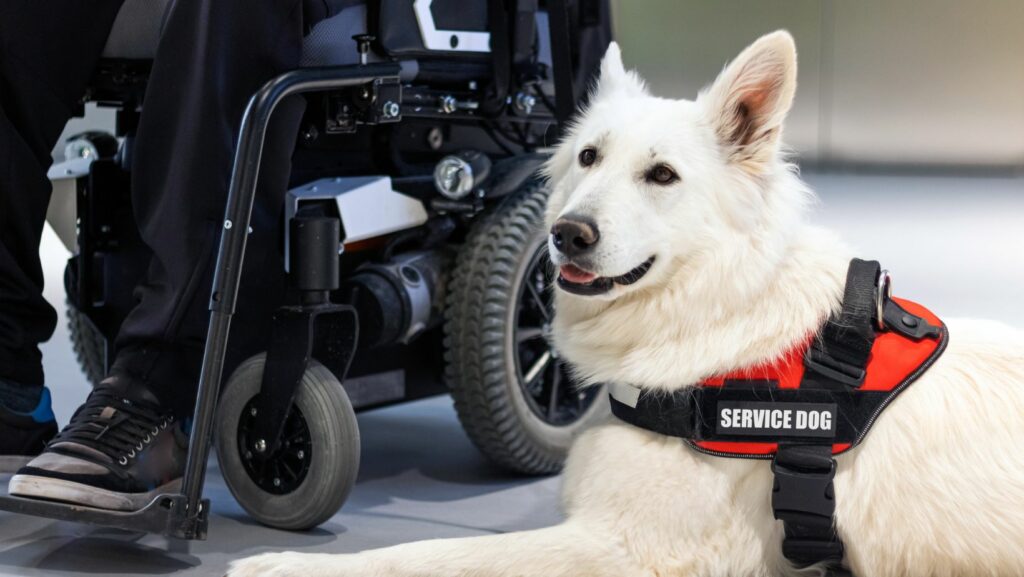Refusing a service dog can bring serious consequences, as refusal of a service dog is generally a violation of the federal Americans with Disabilities Act and state-level disability rights laws. It’s important to understand the penalties for refusing a service dog and what your rights are if you have a service dog so you know when to advocate for yourself.
Our article gives you insight into the penalties for refusing a service dog.
What Are Service Dog Rights?
Service dogs have fairly wide-reaching public access rights, as individuals with service dogs typically need the assistance of their animal wherever they go. Under the Americans with Disabilities Act (ADA), service dogs can accompany their owner into any business, workspace, or housing unit.
These rights allow the individual to access and enjoy their time in public or private spaces the same as any other individual.
The only exceptions to the ADA include limited situations where a service dog can be legally turned away, and religious organizations where permission to bring a dog inside may be needed before access to a service dog is allowed.
When Can a Service Dog Legally Be Refused?
Service dogs, including psychiatric service dogs, that are well-trained and well-behaved should virtually never be refused under the terms of the Americans with Disabilities Act. However, there are a few situations where it may be legal to deny a service dog access:
- The service dog is badly behaved, out of control, or dangerous to those around them
- The service dog cannot enter a space for sanitation and safety reasons, such as an operating room
- The service dog is not properly trained, and damaging a property or being aggressive
Additionally, individuals who ask about a service dog can only ask two questions:
- Is this dog a service dog?
- What work or task has this dog been trained to perform?

No other inquiries, demands for the dog to show their training, or denial of access for an arbitrary reason are allowed.
Potential Penalties for Refusing a Service Dog
There are a few potential penalties that you can face for refusing a service dog access without a valid and legally recognized reason to do so. Business entities, employers, landlords, and property managers can all face serious legal consequences for refusing a service dog entry.
Potential penalties for refusing a service dog include:
- Fines – ADA violation fines start at $75,000 for the first violation and can rise to $150,000 for the second violation
- Lawsuits – Individuals who have had their disability rights violated may be able to bring a lawsuit for damages against the party responsible
- Damaged Reputations – Word of an ADA violation can easily spread through a community, and businesses, employers, and landlords may have to deal with the effects of a damaged reputation and a loss of business
Who Enforces Violations of the Americans With Disabilities Act?
Violations of the Americans with Disabilities Act are generally enforced by the U.S. Department of Justice (DOJ). The Civil Rights Division is the division that handles ADA violations, and the DOJ takes violations of disability rights seriously.
How Do I File a Complaint About an ADA Violation?
If you want to file a complaint about a violation of the rights that are protected under the Americans with Disabilities Act, you can start this process on the ADA’s website.

Not only does this government-run website provide you with the steps to submit a complaint about a violation, but it also gives you access to the legal text of the Americans with Disabilities Act and resources on state laws surrounding disability rights.
Do I Need a Lawyer to Pursue an ADA Violation Case?
In many cases, an ADA violation is not straightforward, and you may struggle to get a business, employer, or landlord to understand that your access rights are protected on both a federal and state level. When this occurs, you will most likely need a lawyer to pursue a lawsuit against the person who violated your ADA rights.
A lawyer will also help you understand the types of damages or lawsuits you can pursue due to an ADA violation.
Understanding Your Service Dog Rights
Service dogs are vital for many people’s well-being, and when you are denied your federally protected right to bring your service dog with you into any business, place of employment, or area of housing, this is a violation of the Americans with Disabilities Act.
If you have experienced a violation of the ADA, you may need a lawyer to help you pursue a claim against the business or entity responsible; file a complaint with the U.S. Department of Justice to get started protecting your rights.

